As much as possible, it is best to be careful and avoid accidents. But accidents do happen despite our best efforts, so if you ever find yourself in a vehicular accident, make sure you prioritize safety by moving vehicles to a safe location, checking for injuries, and alerting authorities. Collecting evidence, exchanging information with other drivers, and contacting your insurance company promptly are also some of the steps recommended by the Metro Manila Development Authority (MMDA) to ensure a smooth resolution and expedite the claims process.
Knowing what to do during vehicular accidents is also important to ensure your safety and the well-being of the others involved. With about 34 deaths due to vehicular accidents every day according to the Philippine Statistics Authority (PSA), being prepared is the best way for you to navigate through the aftermath with composure and confidence. Understanding the necessary steps to take can also streamline the process of filing insurance claims and seeking legal assistance if needed.
Understanding Vehicular Accidents
A vehicular accident refers to a collision involving one or more vehicles on the road. It can range from minor fender-benders to major crashes resulting in injuries or fatalities. These accidents can occur due to various factors such as human error, mechanical failure, adverse weather conditions, or road hazards.
To avoid vehicular accidents, always practice defensive driving by staying alert and attentive while on the road. Obey traffic laws, including speed limits and signals, and maintain a safe distance from other vehicles. Regularly maintain your vehicle to ensure it’s in optimal condition, and avoid driving under the influence of alcohol or drugs.
Vehicular Accidents in the Philippines
Despite the strict regulation of licensing drivers and vehicles, vehicular accidents in the Philippines remain a significant concern, with high incidence rates reported annually. According to data from the MMDA, Metro Manila alone recorded over 65,000 accidents in 2020, resulting in injuries, fatalities, and property damage, despite the continued campaigns toward road safety.
Dealing with Vehicular Accidents
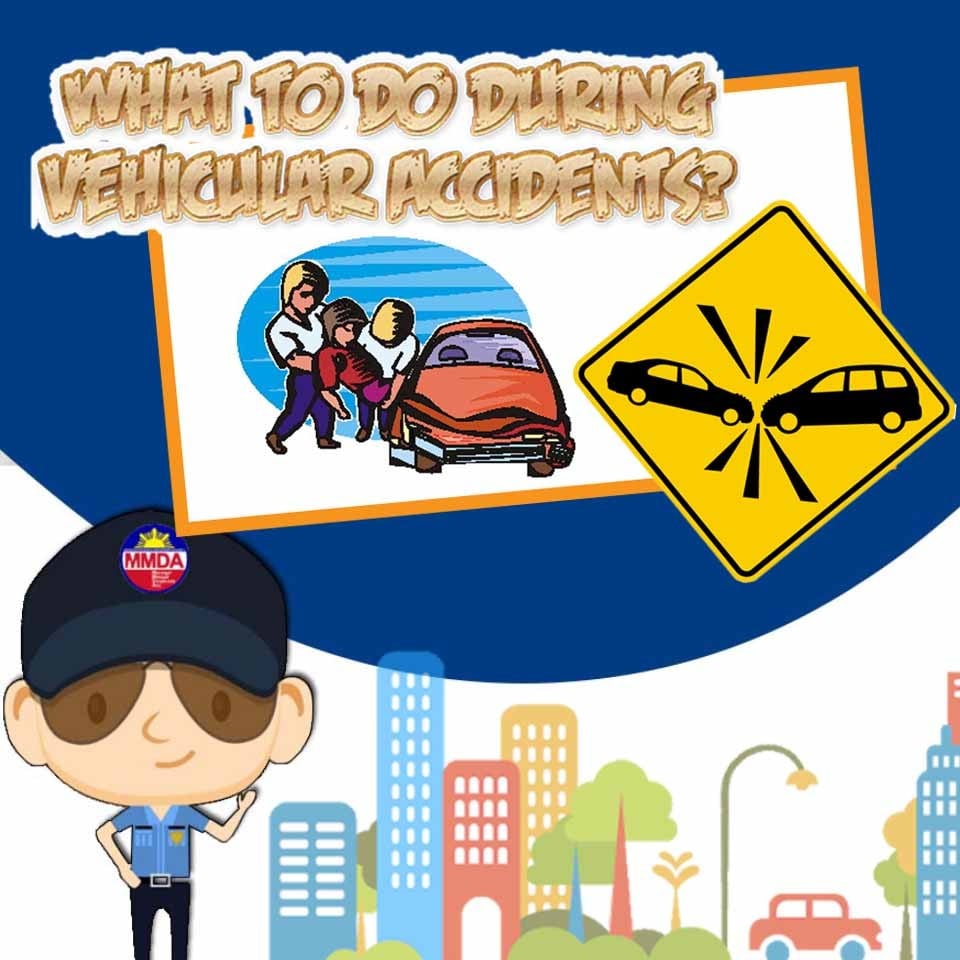
Since accidents can’t be stopped despite the road safety education and campaigns that both the government and individuals take, the second best thing is to understand what to do when vehicular accidents actually happen. In this guide, we’ll provide you with essential steps to take in the unfortunate event of a vehicular accident, whether minor or major, helping you navigate through the aftermath.
Here are some things you need to do in case you get involved or chance upon a vehicular accident:
Safety First
The first thing to do is to prioritize the safety of the people involved in the accident.
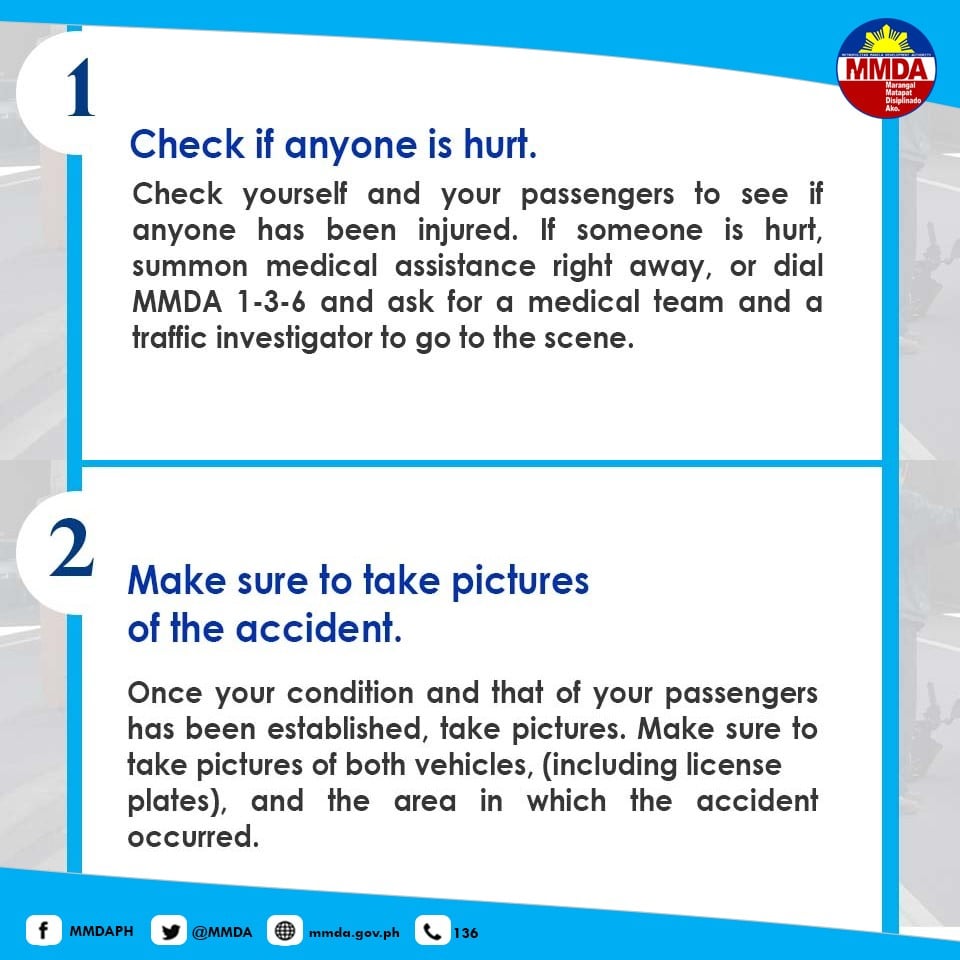
Whether it is you or other people, make sure that the following is observed first and foremost:
- Prioritize Safety
The safety and well-being of everyone involved should be the primary concern. If it’s a minor accident, safely move your vehicle out of the road to avoid obstructing traffic flow. Use hazard lights and warning signs to alert other drivers.
- Assess Injuries
Check yourself and passengers for injuries. If anyone is hurt, call for medical assistance immediately by dialing MMDA’s emergency hotline at 1-3-6. Quick action can save lives.
- Document the Scene
Take pictures of the accident scene, including all vehicles involved and the surrounding area. These photos can be crucial evidence later on, especially if there are disputes about what happened.
Handling Minor Accidents
Minor vehicular accidents typically involve incidents where there is minimal damage to vehicles and no serious injuries to drivers or passengers. These accidents may involve minor collisions, such as rear-end collisions or sideswipes, resulting in cosmetic damage or minor dents. While less severe than major accidents, it’s still essential to handle minor accidents properly and responsibly.
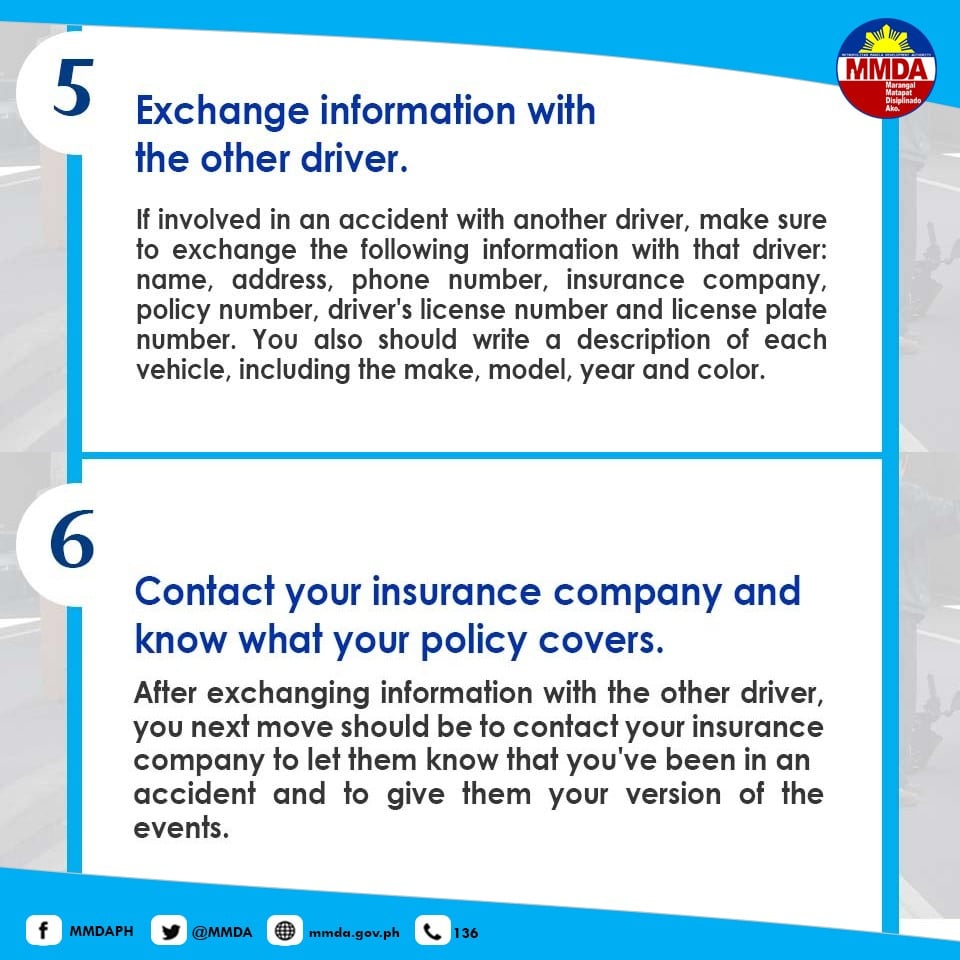
In cases of minor accidents involving yourself, do not forget to do the following:
- Exchange Information
Collect the other driver’s name, address, contact information, and insurance details. Provide your information as well. Try to reach an amicable settlement, but if not possible, involve traffic enforcers by calling the MMDA hotline.
- Contact Your Insurance
Notify your insurance agent immediately and inquire about the repair process. Keep in touch with traffic investigators and file a report if required.
Managing Major Accidents
Major vehicular accidents refer to significant collisions involving multiple vehicles or resulting in severe injuries or fatalities. These incidents often require extensive emergency response efforts, including medical assistance, traffic management, and investigative procedures. Major accidents can have far-reaching consequences, impacting the lives of those involved and prompting efforts to improve road safety measures and enforcement.
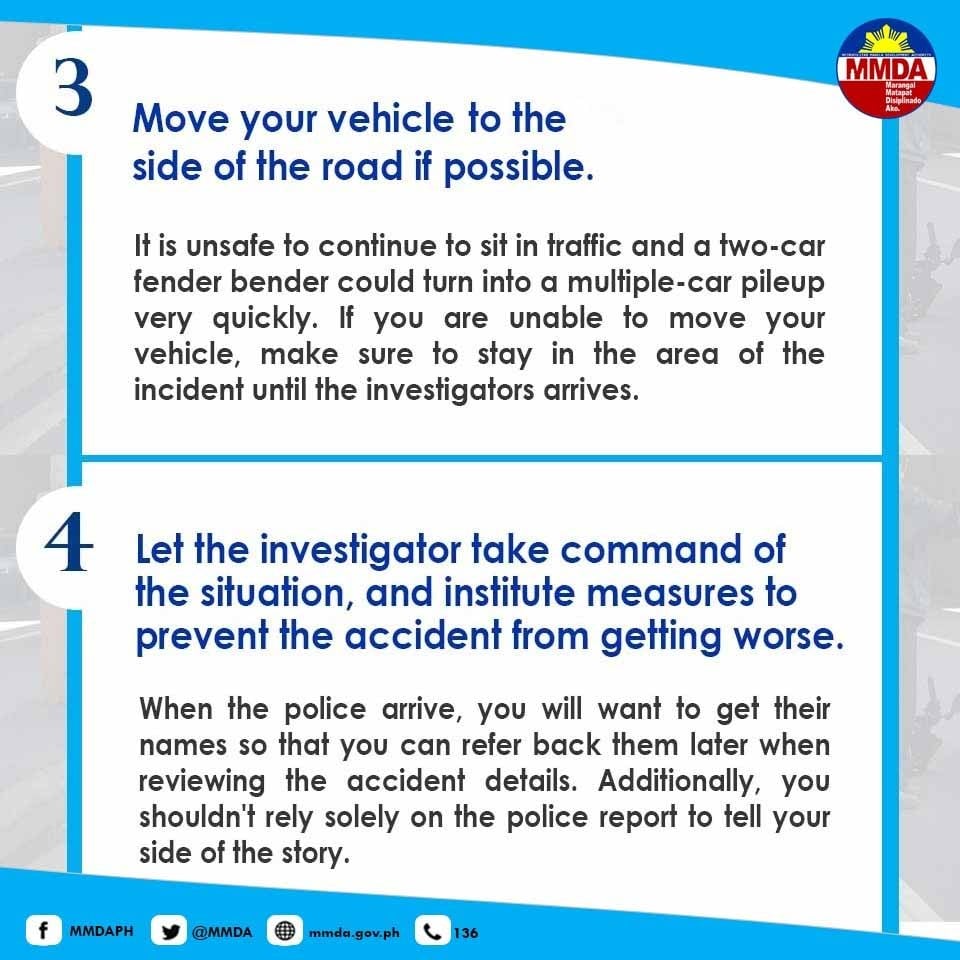
In cases of major accidents, the following things must be done:
- Ensure Safety
Check for injuries and move vehicles to a safe location if possible. Await the arrival of traffic investigators and medical assistance.
- Gather Evidence
Take detailed photos of the accident scene, including both vehicles and any relevant surroundings. Exchange information with the other driver and collect witness statements if available.
- Cooperate with Authorities
Let the police take command of the situation. Provide them with necessary information and cooperate with their investigation.
- Contact Insurance
Report the accident to your insurance company, regardless of fault. Be prepared to provide details and follow their instructions for filing a claim.
- File a Police Report
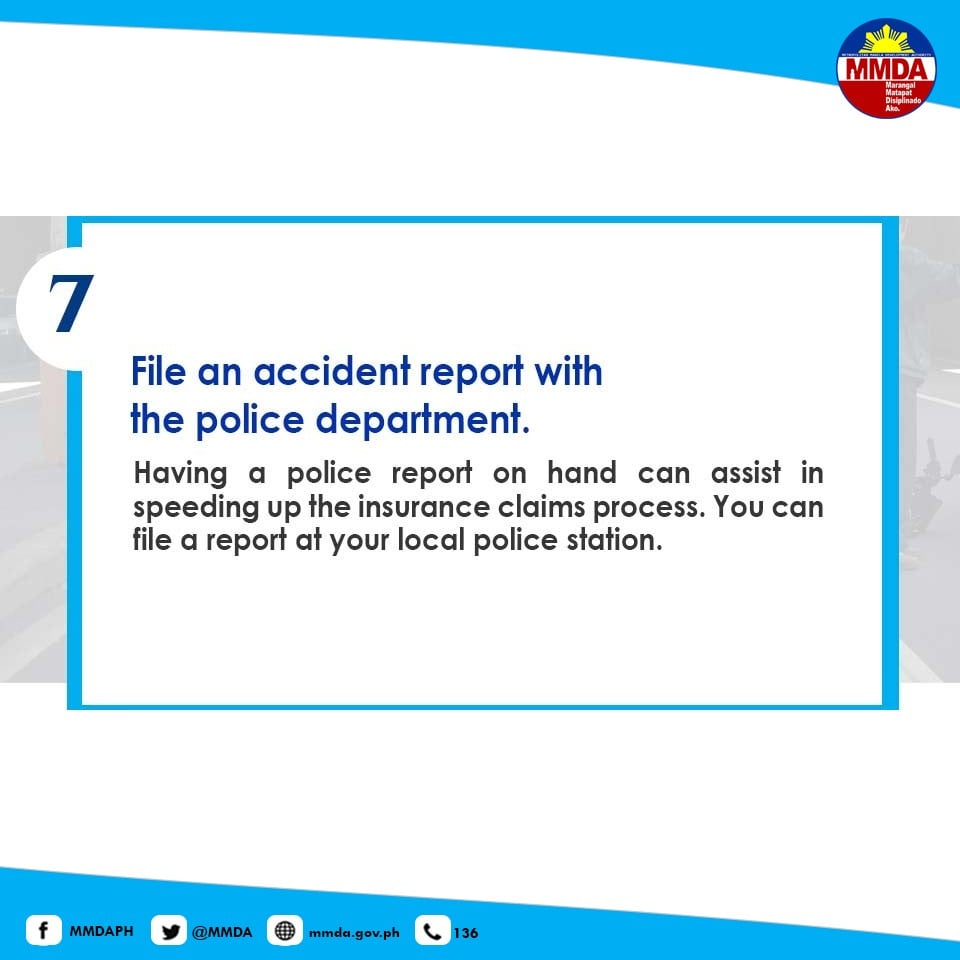
It’s essential to have an official police report, as it can expedite the insurance claims process and provide legal documentation of the incident.
Dealing with Hit-and-Run or Uncooperative Drivers
Hit-and-run incidents occur when a driver flees the scene of an accident without stopping to provide assistance or exchange information. Dealing with hit-and-run or uncooperative drivers during vehicular accidents can complicate the resolution process and hinder efforts to seek justice or compensation for damages. Reporting such incidents to the authorities promptly is crucial for initiating investigations and holding responsible parties accountable, ensuring road safety and legal accountability. Keep in mind that you have to:
- Gather Details
Note down the make, model, and license plate number of the fleeing vehicle. Immediately report the incident to the police or MMDA emergency hotline for assistance.
- Avoid Admitting Fault
Refrain from apologizing or admitting fault, as it may complicate the investigation process. Let the authorities determine fault based on evidence and statements.
Video: What to Do When You Get into A Car Accident
For a detailed guide on what you should do in the event that you get involved in a car accident, you may check this video from Real Ryan:
Summary
Being involved in a vehicular accident can be a stressful experience, but being prepared for the unexpected and knowing how to handle emergency situations can make a significant difference. Remember to stay calm, prioritize safety, gather evidence, cooperate with authorities, and seek assistance to ensure a smooth resolution to whatever problem that may result from the accident.